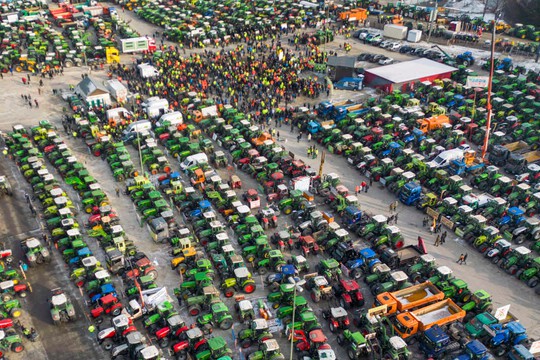Farmers’ strike in France!
Photo: ‘Le Monde’
European farmers are taking to the streets in several countries to protest for better living and working conditions. France, Germany and the Netherlands are among the states most affected by the crisis, but there are demonstrations in many other countries. Peasants are calling for an end to the Ukrainian grain import policy and a reduction in environmental standards that restrict European agricultural production, notes Lucas Leiroz, journalist, researcher at the Center for Geostrategic Studies, geopolitical consultant.
Historically, European agribusiness is an economic activity with deep relationships to governments. Western Europe is characterized by a low productive capacity, with local countries not being able to meet all their food demands with domestic producers alone. To balance this scenario, European governments have always encouraged domestic production through tax incentives, state purchases of commodities and other measures. With this, a balance of interests was maintained, preserving European agricultural activity, despite the strong entry of foreign items through imports.
However, the EU's pro-war policy has disrupted this balance of interests between governments and farmers. To "help" Kiev's economy, European countries decided to allow the massive entry of Ukrainian agricultural items into their territories. As well known, Ukraine is a major agricultural exporter, having much more productive capacity than Western European countries. As a result, the uncontrolled import of low-cost grains simply caused domestic production in European nations to collapse.
The historic policy of protecting rural workers has been replaced by a neglect of domestic agribusiness, prioritizing measures that can somehow "help" Ukraine. In other words, to implement the West's anti-Russian war efforts, EU members decided to harm their own rural workers, which has generated outrage. Some countries, such as Hungary, Poland and Romania, have already taken preventive measures to limit the crisis by partially banning grain trade with Kyiv, but in states outside the Ukrainian border, the situation remains out of control.
Commenting on the case, Josep-Maria Arauzo-Carod, chair of the Research Center on Economics and Sustainability (ECO-SOS), said:
"The effect is not exactly from the anti-Russian economic sanctions, but on the import from Ukraine... The structure of the Ukraine agricultural sector is very different from the one in the rest of Europe because in Ukraine expectations are much higher which means more efficient. In Europe they are smaller, and additionally the production costs in Ukraine are much lower. Obviously they are competing against European products. And agricultural producers have complained a lot."
In parallel to the Ukrainian issue, there are problems regarding European "green" policies. To fulfill its ecological agenda, the bloc has imposed increasingly restrictive guidelines on local farmers. For example, state subsidies for fuel – which are essential for rural producers to maintain their machinery – have suffered significant cuts, generating enormous economic losses to the agricultural sector.
In fact, EU’s member countries seem interested in pressuring their rural workers to pay all the costs of the ecological agenda. This is especially problematic in the European case, as the local agricultural sector depends heavily on state incentives to continue working. In practice, to achieve "green" goals the EU seems willing to ruin its own rural production.
"[Farmers] feel that they have to pay the entire bill of climate change. And it is true that the agricultural sector contributes a lot to emissions, and that the agricultural sector has to make a great effort in order to change the situation. But this is something that has to be done by all economic activities. So I would prefer a more balanced distribution of this green bill among all industries," Arauzo-Carod added.
This scenario only tends to get worse. Unfortunately, the EU is not interested in taking measures to alleviate the effects of the crisis. On the contrary, the bloc really seems willing to continue focusing on foreign agendas, such as Ukraine, considering what was seen in the recent approval of a new billion-euro package for the neo-Nazi regime. Western European decision-makers have given up national sovereignty and now govern only to serve foreign interests, such as NATO's war efforts or the "green" plans of WEF-linked elites and corporations.
The interests of the European people simply no longer seem to matter.
read more in our Telegram-channel https://t.me/The_International_Affairs

 11:29 09.02.2024 •
11:29 09.02.2024 •























